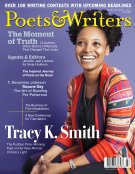There’s no money in poetry,”said poet Robert Graves, “but there’s no poetry in money, either.” Graves’s observation holds true for today’s lit mags, whose editors work to find funding from a wide range of sources—whether it be individual donations, institutional support, or sales. There exists a rich history of patrons supporting the arts, but acclaimed film director Francis Ford Coppola’s San Francisco–based Zoetrope: All-Story (all-story.com) is unique. Editor Michael Ray observed in a recent interview that Coppola—who is the magazine’s publisher, cofounding editor, and initial funder—believes “that the short story is the narrative art form most akin to film, as both forms are consumed in a single sitting.” Each issue of the quarterly Zoetrope is thus a selection of fiction directed, in a sense, by a different guest designer of various artistic disciplines: One issue embodies the elegance of director Agnès Varda (Fall 2013), another the energy and aesthetic of musician Tom Waits (Winter 2005). The recent Winter 2014/2015 issue is designed by musician and artist Bill Callahan and includes new fiction from Frances de Pontes Peebles and debut writer Patrick Cline. Zoetrope accepts submissions of short fiction by mail year-round.
Of course, most journals don’t have the stability of patronage. Thankfully, they all have access to the Internet. In 2014 Randy Rosenthal and Laura Mae Isaacman successfully crowd-funded the debut issue of Brooklyn-based Tweed’s Magazine of Literature & Art (tweedsmag.org). The founding editors distinguish the business model of Tweed’s, published twice yearly, from their earlier, short-lived journal, the Coffin Factory: “With the Coffin Factory we were trying to appeal to a mass market, but Tweed’s will be aimed at a more specialized audience. Think small batch, artisanal, boutique.” Issue Two delivers on that small-batch feel, with a thin but powerful selection of writing on the current global climate, including interviews with Siri Hustvedt and Reza Aslan, an essay by Lydia Davis, and fiction from Daniel Bevacqua. Poetry, fiction, and creative nonfiction submissions will open again in early 2015 via Submittable.
Other journals, such as the Normal School (thenormalschool.com), find their feet—and their funding—in university settings. The seven-year-old biannual journal is housed at California State University in Fresno. The Fall 2014 issue includes new nonfiction from Ann Hood, poetry from Meena Alexander, and fiction from Corinna Vallianatos. The upcoming Spring 2015 issue hits newsstands in April and features “Son of Sam, the expulsion of Adam and Eve, Sigourney Weaver, growing up in an anarchist colony, blood sacrifice, and nightclub fires,” says cofounding editor Sophie Beck. Submissions in poetry, fiction, and creative nonfiction are considered from January 15 to April 15 and September 1 to December 1 by mail or online with a three-dollar reading fee.
Established in 2003 by Amanda Raczkowski, Joseph Reed, and Donna Weaver, Pittsburgh-based indie annual Caketrain (caketrain.org) operates mostly on individual issue sales and submission fees from its annual book contest. The journal, which can always be relied on for heartbreaking and dexterous language, doesn’t disappoint with its latest issue, Caketrain 12, featuring a series of vertiginous poems from Alyse Knorr and new fiction from Brian Evenson. Submissions of poetry, fiction, and creative nonfiction are currently being considered for Caketrain 13 by e-mail at editors@caketrain.org.
Meanwhile, Belfast-based Irish Pages (irishpages.org), which boasts subscribers from across the globe—from the Middle East to its native Northern Ireland to the United States—makes use of its international audience for funding, gathering support through grants from Irish arts councils and donations from individuals throughout Ireland and abroad. The biannual magazine, which is edited by Chris Agee and features work from both Irish and international writers, also relies on issue sales; Agee says the office has been “overwhelmed with direct orders” for its massive new “Heaney” issue (8.2), which memorializes late poet and Nobel laureate Seamus Heaney and includes pieces by critic Helen Vendler and Irish president Michael Higgins. The “After Heaney” issue, forthcoming in late 2015, will focus on Heaney’s creative and cultural legacy. Submissions of poetry, fiction, and nonfiction in both Irish and English are considered by mail year-round.
Travis Kurowski is the editor of Paper Dreams: Writers and Editors on the American Literary Magazine, published in 2013 by Atticus Books. His website is traviskurowski.com.








